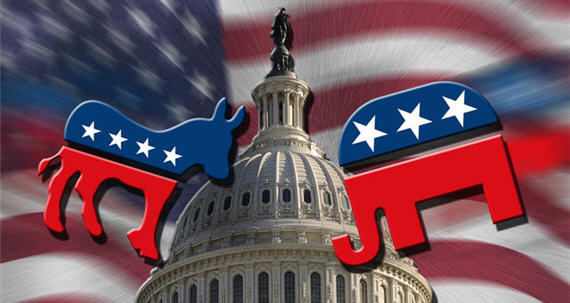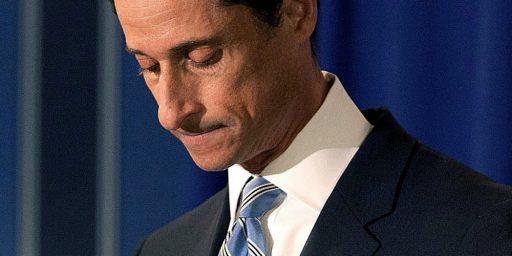Has Social Media Taken The Sting Out Of Political Scandal?
Does the public still care about the personal transgressions of politicians? The evidence seems to suggest they don't.
Last weekend, Idaho Senator Mike Crapo was arrested in Alexandria, Virginia and charged with driving under the influence. As it turned out, Crapo had a blood alcohol level that was .03 points above the legal level for intoxication in Virginia. The incident raised a few eyebrows, not the least because Crapo is a Mormon and thus supposedly does not drink alcoholic beverages. In any case, Crapo issued an apology within hours of of the incident becoming public and, by Christmas, Idaho’s largest newspaper was issuing an editorial saying that the incident should not be considered a black mark on Crapo’s career. All of this leads Buzzfeed’s Ben Smith if, thanks to things like Facebook, we’ve reached a point where the sting of personal embarressment has become less harmful for politicians:
Drunkenness, affairs, secret gay relationships, dodgy financial dealings, and other sins have been common in public life since the Jewish and Roman historians started documenting them. But for most of American history, most Americans didn’t want to know, a desire affirmed by last year’s cringe-inducing memoir by a teenage girlfriend of John F. Kennedy. The demand that politicians actually live up to their virtuous facades, enforced by press and prosecutors for the last few decades, reached its peak in the exposure of Bill Clinton’s affair with an intern, Monica Lewinsky. And the sanctimonious approach by some press and prosecutors has been — as the national revulsion at the Starr Report, and bipartisan embarrassment at its memory has showed — basically unwelcome.
Now America is on the cusp of an end to that anomalous era. This change, very much still in its beginnings, is defined, most of all, by Facebook, where an ever-increasing share of Americans (and their so-called friends) have preserved embarrassing moments. Members of Mark Zuckerberg’s Harvard Class of 2006 who made it to graduation will be eligible to run for Senate in 2014. The early jokes that nobody of that generation would ever survive public life have been replaced by the reality that they all will. They’ve been building their memoirs of occasional error and excess, Obama style, in real time on their Timelines, with little calculation and far too much information.
This isn’t to say that the politics of the social media age has lost interest in personal weakness. To the contrary: The whole palate of sanctimony, schadenfreude, prurience, partisan relish, and discussion of character played out on Twitter over the course of a couple of hours Sunday evening as Crapo’s arrest was made public. His name (CRAY-po!, the AP insists) was subject to the obvious jokes and the additional note that it’s an anagram for “O, Crap.” But Twitter politics burn hot and fast, and are often goodhearted or sympathetic in a way that isn’t in the range of a tabloid headline.
It’s certainly the case that the public attitude toward at least some of the personal scandals that plagued politicians starting roughly in the 1970s when, partly in response to the Watergate Era, ended the “code of silence” that had once existed in Washington regarding the private lives of powerful people. Whereas the long-term affair that Franklin Roosevelt had during his time in office, or the numerous dalliances of President Kennedy, were treated with the journalistic equivalent of a “wink and a nod,” we entered an era when essentially private activity by politicians became public fodder and many careers were ruined. Granted, in many cases, the events that led to these downfalls were prompted by what can only be called incredibly stupid or reckless behavior by the people involved (Gary Hart’s challenge to the press that they should follow him if they believed he was being unfaithful to his wife comes to mind). In others, such as the more recent examples of former New York Governor Elliot Spitzer, former Senator and Presidential candidate John Edwards, and former New Jersey Governor Jim McGreevey involved illegal or unethical activities. However, it’s also true that, for a long time, the press focused on essentially private behavior by politicians and those in power not necessarily because it was relevant to their jobs, but because it satisfied some prurient interest and, of course, brought in the ratings. For a long time, the public actually seemed to care about these types of stories when they went to the polls, but that doesn’t seem to be the case anymore. After all, Bill Cinton is arguably the most popular politician in America despite the fact that he engaged in an affair with a 21 year-old intern while he was in the White House. Would that have happened in 1960 if people had known about JFK’s dalliances? I’m not so sure.
That doesn’t mean that a politician who does commits some transgression isn’t going to have to worry about the voters any more, that’s something that will likely be decided on a case-by-case basis. In Crapo’s case, he’s not up for re-election until 2016 and in his last election he beat his Democratic opponent by more than 200,000 votes. This is, after all, Idaho and Crapo is a Republican. Absent some evidence that there are more serious issues regarding his personal life or his behavior in office I suspect he’d be easily re-elected in four years should he choose to run. In some cases, though, I’m sure that there will be cases were personal behavior does spell the end of a political career. Indeed, in the just about to conclude 112th Congress we saw many examples of it, the most extreme, of course, the bizarre behavior and downfall of Anthony Weiner. What’s clear, though, is that personal transgressions are no longer the death sentence for a political career that they used to be.
Smith suggests that this means that the political media is going to have to adjust how it reports these kinds of stories:
This new era isn’t a return to the old media silence about sex, drugs, and other foibles in the corridors of power. That’s obviously gone, and there’s no suggestion that Americans have grown too mature to gossip about their leaders, if such a thing is a sign of maturity. The reality, for better or worse, is that Americans seem capable both of being amused by and interested in their leaders’ foibles without withdrawing their support from those politicians. Voters’ comfort with this will be welcomed, of course, by the political class; the biggest problem it poses is for the press, which will have to find a mode other than outrage in which to cover the intersection of the political and the personal.
It depends, I suppose, on the type of transgression we’re talking about. Personal sexual peccadilloes are likely to be viewed less seriously than a criminal offense of some kind, quite obviously. However, does that mean that every little transgression by a politician should be treated as an “Outrage Of The Day?” It seems the public’s answer to that question is no.






I’d credit the insane effort by Republicans to carry out a coup-via-impeachment against Bill Clinton as the essential cautionary tale. That was a lesson in how unscrupulous politicians will escalate personal matters to the point of threatening democracy.
But, yes, I also think social media has something to do with it. In fact, I’ve been predicting that in the very near future all those embarrassing photos online will lose all their stig because 90% of the population will have the same sorts of things online.
You can only exploit personal peccadillos where hypocrisy allows some to claim moral high ground. No high ground = no advantage.
That said: drunk driving is not a peccadillo. You can kill people doing that.
It’s not a Facebook thing. It’s like real estate: location, location, location. It’s also an incumbency thing, along with that of tribal adherence to party labels. It’s also a function of Zombieland.
Alcee Hastings when he was a federal judge was impeached and then convicted by the Senate for good measure and quite literally removed from office. Not only did he then get elected to Congress he’s been reelected numerous times, and will continue to be reelected even after he’s deceased. Location, location, location.
Gavin Newsom not only is a womanizer he’s a drug-addled freak. Not a major issue in San Francisco nor for California at large.
Edwin Edwards was so corrupt he had a separate in box on his desk for federal corruption indictments. Not a major issue in Louisiana. In that state they’d think less of you if you weren’t corrupt. Plus until very recently in various areas of the Deep South it basically was impossible for a Democrat not to win a statewide election.
If someone named Daley killed a person on live TV they’d probably still get elected Mayor of Chicago. I’m not entirely being figurative.
Ultimately the issue is that the public has been dumbed down. Fifty or so years of airheaded leftism in the media and on college campuses have taken their tolls.
Two points:
First, drunk driving is generally considered a minor peccadillo in society — so long as there isn’t a pattern and no one gets injured at least. It’s something that everyone who drives and drinks socially recognizes that they might have done at some point, and I think people are predisposed to believe that an individual made an error in judgement rather than that he’s a raging alcoholic who gets behind the wheel. Add to this that Crapo has, so far, handled this well, and it is unlikely to deeply tarnish his reputation — if he starts going to high schools and colleges to tell kids that alcohol affects your ability to realize how much alcohol affects your ability to drive, he can possibly even turn it into a positive.
Second, there’s a different standard for Republicans and Democrats. Had Crapo been a Democrat, this would have been picked up as the outrage du jour at the very least, and the number of people killed by drunk drivers every year would be mentioned non-stop, and every comment about lunatics with guns would be suddenly turned into a conversation about how many people Crapo could have killed.
In Weiner’s case, what he did was so egregiously sleazy that it called into question his judgment. How smart is it to send photos of your genitalia to virtual (in all senses) strangers who follow you on Twitter, particularly when you’ve been married less than a year and your wife, also a public figure, is pregnant? Giving in to that kind of urge–particularly by a public servant in the public eye–almost argues for the existence of some kind of psychiatric disorder.
On the other hand, driving drunk doesn’t argue for good judgment, either.
@Tsar Nicholas:
Matthew 7:3
In the case of Edwards, it wasn’t that he had an affair, it was that he had an affair while his wife was battling cancer. That takes a special kind of d!ckishness.
The Onion already addressed this issue.
Voters used to shun the lechers and liars. Sen. Vitter broke the standard into a million pieces. Mr. Crapo has a role model.
Scandals like these are only for Democrats — because only Republicans pretend to care about a politician’s personal “morality.” Of course they don’t give a rat’s ass — witness them following Newt in impeaching Clinton for sex with an intern while Newt himself was doing exactly the same thing — but they’ll use it as a weapon against their opponents, and their followers will whip themselves into a fury about the corruption in the capital. And then ignore, say, a Republican senator dressing up in diapers and paying whores to spank him.
@Tsar Nicholas:
Yes, because the “national revulsion at the Starr Report” that is reference in the original article was a byproduct of “airheaded leftism”.
Jesus Christ, you’re an idiot.
You poor thing…always hurt by the media and educational establishments….you really are such a pathetic victim….oh, and for every Alcee Hastings, Gavin Newsom, or Edwin Edwards, there’s Tom Delay, John Ensign, David Vitter, Ted Stevens, and Newt Gingrich, among many others…
@An Interested Party: It’s going to drive the right wing morons out there insane when Gavin Newsome becomes governor of California. Because on the one hand, he cheated on his wife, unlike any Republican in history, and he’s come out in favor of legalizing pot, which to dopes like the Tsar means he’s a junkie. On the other hand, he’s a hugely successful businessman, and he was a courageous and brilliant mayor of San Franciso. And he really, really knows what he’s talking about.
So he’s this pretty-boy lefty — and he’s going to be a great governor without pretending for a second to have anything in common with Republicans.
I think it’s more the degree of hypocrisy associated with the exposed act or crime rather than the social media. The Larry Craigs, John Edwards and John Ensigns get hammered pretty hard. Of course what will ruin my theory is if Mark Sanford runs and is elected.
@Andy: Bwahaha! Thank you, sir.
Wow, who down-votes the Onion? Lighten up people.